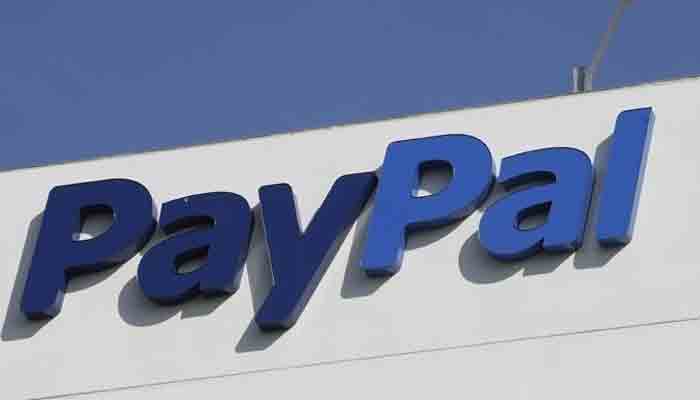PayPal’s absence pales into insignificance on growing substitutes
PayPal’s absence in Pakistan’s e-commerce sector has paled into insignificance with increasing penetration of wire transfer services, digital experts said.
KARACHI: Absence of American online payment firm PayPal has paled into insignificance with increasing penetration of wire transfer services in Pakistan’s cyber space, digital experts said on Saturday.
Payoneer, TransferWise and Western Union are some of the international names already operating in the country, facilitating transfer of money from across the world.
PayPal is also indirectly operating in the country with its subsidiary Xoom. It is the fastest and efficient means of wire transfer to local banks.
Industry people said thriving gig community in Pakistan is using the service to receive remittances into their bank accounts from foreign employers.
“So, it is not a big deal if PayPal is not here,” Umair Mohsin, program manager at the National Incubation Centre said.
The centre is a state-backed platform to promote start-ups. “Most of moneys come to Pakistan in any ways.”
But, the shiny brand – as PayPal is – makes digital community and online consumers in the country crave for it.
All the governments have been struggling to pull the service into the country, but the online payment gateway is reluctant to venture into the dollars-strapped country with tight regulations over outflow of foreign exchanges.
Money laundering laws also need to be implemented in letter and spirit to lure big names in online payment industry, according to the analysts.
“Currently, the State Bank of Pakistan makes it mandatory on payment gateways to connect with Pakistani banks for inbound transactions,” Mohsin said. Pyoneer is connected with Bank Alfalah. “Peer-to-peer transactions are not possible.”
Zeeshan Ali, digital media lead at Telenor Pakistan however said PayPal’s presence is important as it would strengthen connection of local ecommerce market with the world.
“Payment security would also be increased,” Ali added. “PayPal focuses on dispute resolution and therefore it guarantees payment security to both merchants as well as consumers.”
The SBP said the sales of local and international e-commerce merchants grew 93.7 percent year-over-year to Rs40.1 billion in the last fiscal year of 2017/18.
The data covers transactions made via digital channels (credit/debit cards, interbank funds transfer, prepaid cards, and mobile wallets.
But, the share of postpaid cash on delivery settlements was around 80 to 90 percent of the total volume, and about 60 percent of the total value of e-commerce, according to the central bank.
“So, tendency of people to use online payments should be increased first,” Ali Aziz, chief executive officer of ecommerce site Shopistan.pk said.
Shopistan.pk sells 15 local brands to local as well as international markets.
It receives 35 percent of its orders, mainly garments, from international consumers, including US and Canada.
“Yes, the payment service is secure and must boost cross-border online trade in Pakistan,” Aziz said.
“Currently, only a small portion of consumers make online shopping from across the border.”
Adam Dawood, chief executive officer of online shopping portal Yayvo agreed that the entry of PayPal would not make any difference on local domestic ecommerce players.
“A number of local payment services have emerged in the market over the past years.” Digital wallets EasyPaisa, JazzCash and SimSim facilitate online payments for shopping.
Yayvo, launched by courier service TCS, has 150,000 products on its platform.
It racks up 80 percent of the revenue from prepayment channels, mobile wallets and other local payment gateways.
-
 Seedance 2.0: How It Redefines The Future Of AI Sector
Seedance 2.0: How It Redefines The Future Of AI Sector -
 Andrew Mountbatten-Windsor Still Has A Loan To Pay Back: Heres Everything To Know
Andrew Mountbatten-Windsor Still Has A Loan To Pay Back: Heres Everything To Know -
 US House Passes ‘SAVE America Act’: Key Benefits, Risks & Voter Impact Explained
US House Passes ‘SAVE America Act’: Key Benefits, Risks & Voter Impact Explained -
 'Heartbroken' Busy Philipps Mourns Death Of Her Friend James Van Der Beek
'Heartbroken' Busy Philipps Mourns Death Of Her Friend James Van Der Beek -
 Gwyneth Paltrow Discusses ‘bizarre’ Ways Of Dealing With Chronic Illness
Gwyneth Paltrow Discusses ‘bizarre’ Ways Of Dealing With Chronic Illness -
 US House Passes Resolution To Rescind Trump’s Tariffs On Canada
US House Passes Resolution To Rescind Trump’s Tariffs On Canada -
 Reese Witherspoon Pays Tribute To James Van Der Beek After His Death
Reese Witherspoon Pays Tribute To James Van Der Beek After His Death -
 Halsey Explains ‘bittersweet’ Endometriosis Diagnosis
Halsey Explains ‘bittersweet’ Endometriosis Diagnosis -
 'Single' Zayn Malik Shares Whether He Wants More Kids
'Single' Zayn Malik Shares Whether He Wants More Kids -
 James Van Der Beek’s Family Faces Crisis After His Death
James Van Der Beek’s Family Faces Crisis After His Death -
 Courteney Cox Celebrates Jennifer Aniston’s 57th Birthday With ‘Friends’ Throwback
Courteney Cox Celebrates Jennifer Aniston’s 57th Birthday With ‘Friends’ Throwback -
 Camila Cabello Shares Update On Her Hair Two Years After Going Platinum
Camila Cabello Shares Update On Her Hair Two Years After Going Platinum -
 Prince William Steps In To Help Farmer's Awareness Mission
Prince William Steps In To Help Farmer's Awareness Mission -
 Queen Elizabeth Tied To Andrew's Sexual Abuse Case Settlement: Report
Queen Elizabeth Tied To Andrew's Sexual Abuse Case Settlement: Report -
 Mark Ruffalo Urges Fans To Boycott Top AI Company Boycott
Mark Ruffalo Urges Fans To Boycott Top AI Company Boycott -
 Prince William Joins Esports Battle In Saudi Arabia
Prince William Joins Esports Battle In Saudi Arabia




